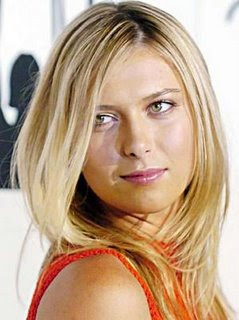
Sharapova revisits her past as a child of Chernobyl
There's more to Maria Sharapova than tennis and pretty dresses, writes Mark Hodgkinson in Miami.
Glambassador … Maria Sharapova off court.
CHERNOBYL has been in Maria Sharapova's thoughts lately. Mostly that she considers herself extremely fortunate to have escaped the effects of the world's worst nuclear accident, dodging both possible radiation poisoning and death. Sharapova, a woman usually associated with sporting prowess and frothy, girly glamour, is a "Chernobyl survivor".
In her first interview about the impact the calamity at the nuclear power station has had on her family's history, she spoke of how she could very easily have been among the victims. "When I look back at what happened, I just think, 'Oh, my God, I just can't believe it. I feel so lucky that I got out of it, that I got out of there.' So many people didn't get out of it. I am lucky to be alive and well," she said.
Sharapova disclosed that the key to her coming through unharmed could have been the action taken by her parents, Yuri and Yelena. In the months after the reactor exploded in April 1986, which is said to have thrown out contamination equivalent to more than 100 medium-sized atomic bombs, Sharapova's parents were living in Gomel in Belarus, 128 kilometres north of Chernobyl. Sharapova's mother was pregnant with her at the time, and was fretting about what the toxic fallout could do to her unborn daughter.
And so they fled Belarus and moved to Siberia, where temperatures in winter can drop to minus-40 degrees, one of only a few places to which the then-poor Sharapova family could afford to move. It was there, in the town of Nyagan, that Sharapova, a thankfully healthy child and a future Wimbledon champion and world No.1, was born in April 1987. "I still talk to my mother about that, it pops up in conversation from time to time," Sharapova, 19, said. "She has told me that she was really worried about the radiation possibly affecting me before I was born, and about all the possible illnesses and cancers."
Chernobyl has been on her mind since she became a goodwill ambassador for the United Nations development program. She called her $1 deal with the UN her "proudest contract ever". She has already donated more than $120,000 towards those affected by the accident, with the money to be shared between eight projects to help children in rural communities.
It is not the first time Sharapova has donated a large sum after a disaster in her homeland, as she auctioned off a Porsche she had won at a tournament and gave the proceeds to the victims of the Beslan school massacre where Chechen rebels killed more than 300. Sharapova acknowledged that, as well as adding to the funds, she could also use her celebrity to draw the public's attention to the Chernobyl accident. At her appointment as a UN ambassador in New York, she admitted she was more nervous before than she had been before any grand slam tennis match. "Tennis is only a little game, that's all. I hope people don't look at tennis players like me and think we aren't connected with life outside tennis. We do watch the news, we do see what's going on and we do care. I know that tennis isn't the most important thing," said Sharapova, who lost to Serena Williams in the fourth round of the Sony Ericsson Open in Miami on Tuesday.
No comments:
Post a Comment